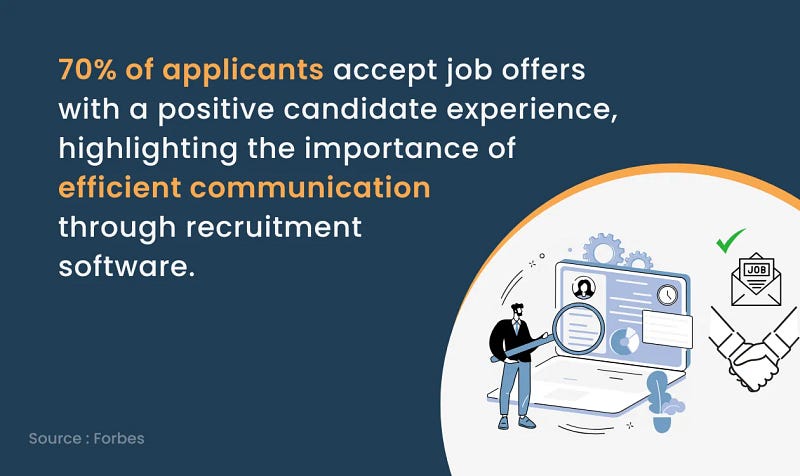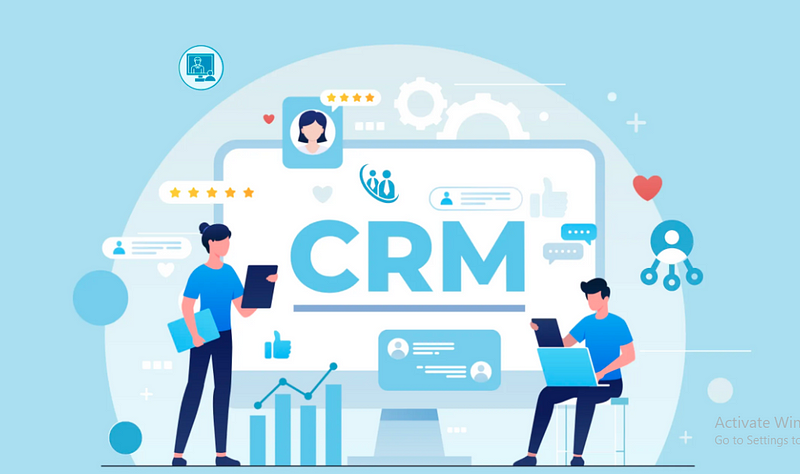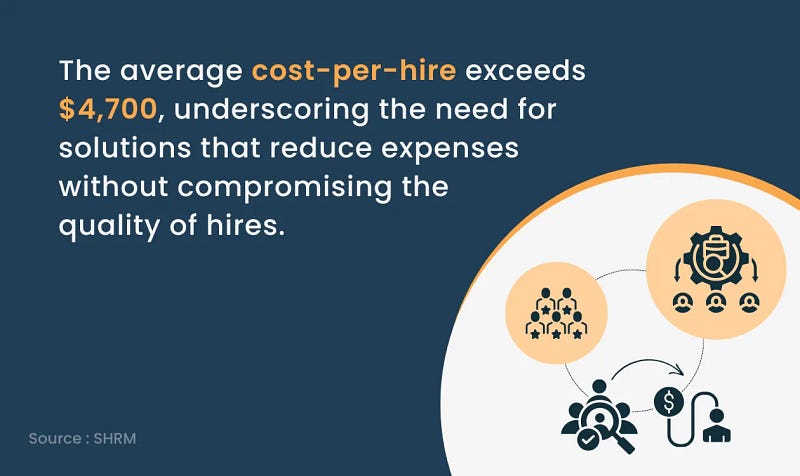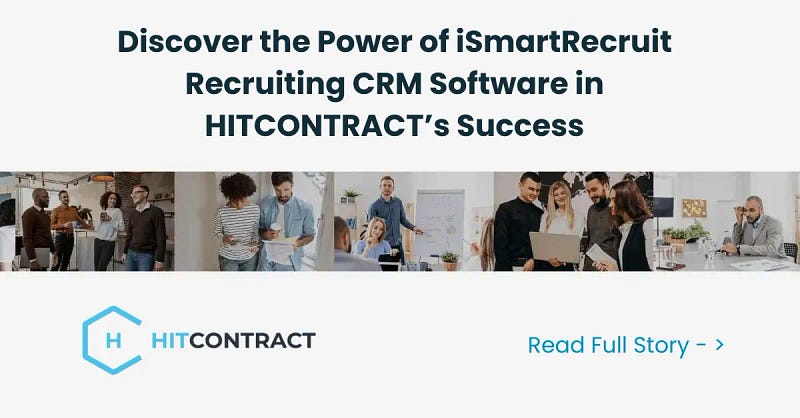
We all know that the recruitment landscape is rapidly changing every single day due to the development of technology. In such a fast-paced era, RPO (Recruitment Process Outsourcing) stands as a beacon of innovation and efficiency.
Nowadays, different organisations need a unique set of talents and aspirations. In such a competitive job market, success is measured not just by the skills that fill its offices but also by the strategic manner in which those skills are sourced. This is where RPOs shine and act as the master architects of talent acquisition, sculpting the workforce of tomorrow.
Now, are you wondering how can the complete RPO processes be conducted smoothly? Well, many technology enthusiasts have had the same question, and that’s where a new protagonist was designed– RPO software.
In 2024, this digital companion is not just a tool but a partner in the art of recruitment, each with its symphony of features and capabilities.
That is why choosing the right RPO software is similar to selecting the perfect instrument in an orchestra — vital for harmony and success for RPO companies and RPO recruiters.
So, when we researched deeply, we understood how important it is for RPO businesses to choose the right RPO technology.
So, dive deep into this masterful piece of top 5 RPO software of this year and learn the secrets to selecting the best one, ensuring your RPO narrative is not just heard but also resonates across the realms of talent and technology.
So, what are you waiting for? Let’s dig in!
What is RPO Software?
Recruitment Process Outsourcing (RPO) Software is a tool used by RPO companies to streamline and enhance their overall recruitment process. It automates and organises hiring tasks, making it easier for RPO recruiters to find and hire suitable candidates for their clients. It is also known as the RPO system.
Let’s now explore the best RPO systems for success in 2025.
Top 5 RPO Software for 2025
Are you looking for the leading RPO software solutions list of 2025?
Then, dive into our carefully curated list, which features the top 5 RPO platforms globally. Each offers unique capabilities to revolutionise and enhance your hiring process.
This way, you will be able to find out which software aligns best with your recruitment strategy to enhance efficiency, streamline candidate sourcing, and leverage cutting-edge RPO technology in your hiring practices.
Let’s get started.
1. iSmartRecruit — All-in-one RPO Software Solution
iSmartRecruit is an easy-to-use RPO software solution designed for all sizes of RPO businesses to enhance the efficiency of recruitment processes. Mainly, it focuses on streamlining tasks and organising the hiring workflow, which ultimately ensures a smoother and more efficient candidate sourcing and management experience.
This best RPO software is well-received for its user-friendly design and functionality, which align perfectly with different recruitment stages and offer great value for money.
It integrates AI and automation to boost productivity and streamline hiring operations. This RPO software is recognised for its customisation, cutting-edge features and scalability, making it a suitable choice for RPO recruiters.
Key Features
- ATS & Recruiting CRM System
- Efficient Candidate/Client Management
- AI and Automation Capabilities
- Streamlined Workflow Automation
- Analytics and Reporting
- Centralised Communication & Team Collaboration Portal
Pricing
iSmartRecruit offers a versatile pricing structure designed to accommodate businesses of all sizes, from small startups to large established companies. For a tailored pricing plan, you can reach out to their sales department at sales@ismartrecruit.com.
Capterra Review: 4.6/5 from 114 reviews
2. BrightMove
BrightMove’s RPO (Recruitment Process Outsourcing) software solution is a robust and versatile tool designed for the modern recruitment landscape. It provides an integrated platform that caters to the needs of RPO providers by offering streamlined and efficient management of the entire recruitment process.
With its advanced search capabilities and comprehensive analytics, BrightMove stands out as a powerful ally for RPO firms looking to optimise their operations.
Key Features
- Third-party app integration
- In-depth reporting
- Advanced hiring analytics
- Custom branding options
Pricing
BrightMove offers a customisable pricing structure tailored to meet the needs of each business; for detailed pricing information, please reach out to their sales team.
Capterra Review: 4.3/5 from 274 reviews
3. Inrecruiting
Inrecruiting’s RPO software solution is a game-changer in the talent acquisition landscape. It offers a complete and AI-powered Applicant Tracking System (ATS) designed to streamline the entire recruitment process.
This cloud-based software is specifically tailored to manage end-to-end recruitment and talent acquisition, handling repetitive, low-value activities with ease.
From attracting the potential candidate to onboarding the suitable talent. Inrecruiting enables RPO recruiters to centralise the entire process, leveraging advanced ATS features, recruitment marketing tools, and proprietary artificial intelligence to automate tasks and workflows.
Key Features
- AI-powered Applicant Tracking
- Recruitment Marketing Tools
- Task Automation and Workflows
- Advanced Analytics
Pricing
- Espresso Plan — €59 /month
- Lungo Plan — €199 /month
- Cappuccino Plan — €238 /month
- Enterprise Plan — Contact sales for custom pricing
Capterra Review: 4.3/5 from 49 reviews
4. Loxo
Loxo RPO Software stands out for its comprehensive features, which include job distribution, resume parsing, and task management. Additionally, it offers CRM tools and compliance functionalities, ensuring that the recruitment process is not only efficient but also adheres to necessary standards and regulations.
This innovative platform is designed to assist companies of all sizes in finding, hiring, and retaining top talent efficiently. Loxo’s user-friendly and AI-enhanced recruiting solutions automate and optimise the hiring process, making it more streamlined and effective for businesses. This platform is particularly beneficial for automating repetitive tasks, enabling recruiters to focus on more strategic aspects of talent acquisition.
Key Features
- AI-Powered Recruiting
- Applicant Tracking System
- Resume Parsing
- Task Management
Pricing
- Free Plan — Free forever
- Professional — $299 — Per seat / Per month
- Enterprise — Custom pricing
Capterra Review: 4.7/5 from 109 reviews
5. Firefish
Firefish RPO Software is specifically designed for recruiters, by recruiters, to ensure that every feature is meticulously crafted to meet the industry’s unique demands.
The platform stands out for its intuitive interface, making navigation and management of recruitment tasks straightforward and efficient. It’s an ideal choice for agencies seeking to streamline their recruitment operations and enhance candidate engagement.
Key Features
- Integrated CRM and ATS
- Candidate Engagement
- Task and Workflow Management
- Social Media Integration
Pricing
- Basic Plan — £80/per user monthly
- Professional Plan — £90/per user monthly
- Enterprise Plan — £105/per user monthly
Capterra Review: 4.6/5 from 289 reviews
How do you Choose the Right RPO Software in 2024?
Are you looking for a recruitment process outsourcing (RPO) software solution?
Then, there are several key factors you need to consider in order to choose a tool that streamlines and improves your recruitment needs. Here are the key points you must check out:
1. Assess essential functionality and features
Look for crucial functionalities you will need, such as applicant tracking systems (ATS), candidate sourcing, screening, interviewing, and onboarding capabilities. Advanced features might include AI-driven candidate and job matching, analytics, and reporting tools.
2. Analytics and Reporting
Look for robust analytics and reporting capabilities. This includes the ability to track recruitment key performance indicators (KPIs) such as time-to-hire, cost-per-hire, and the effectiveness of different recruitment channels.
3. Can you integrate it with existing systems?
It is important that your RPO software seamlessly integrates with your current HR and hiring tools. You need to check whether the RPO software is compatible with existing HRIS (Human Resource Information System), payroll systems, and other business software to secure smooth data flow and process continuity.
4. Review Scalability
You need to consider how well the RPO software can adapt to your organisation’s hiring needs and growth. The software should be scalable to handle increasing volumes of recruitment activities without a drop in performance.
5. What are the compliance and security measures?
Ensure the software complies with relevant legal and regulatory standards, especially concerning data protection and privacy laws like GDPR. Security features to protect sensitive data are crucial.
6. Is the RPO software customisable?
The ability to customise the software to fit your specific client’s needs and recruitment processes is essential. It includes custom workflows, branding options, and flexible feature configurations.
7. Does the software provider offer prompt support and live training?
Check out the level of customer support and training provided by the vendor. Reliable technical support, comprehensive training resources, and a responsive service team are incredibly important for smooth implementation and ongoing use.
8. Get a free trial and demo of the RPO software
If possible, opt for a trial period or request a demo to test the RPO system’s capabilities and ensure it meets your expectations before making a final decision.
9. Vendor Reputation and Reviews
Research the vendor’s reputation in the market. Look for online case studies or client testimonials from other organisations, especially those similar in size or industry to your own.
You will be all set by carefully evaluating the abovementioned essential factors to choose an RPO software solution that enhances your recruitment process, aligns with your organisation’s recruitment goals, and provides a good return on investment.
Top Benefits of RPO Software
Why do you need an RPO software solution in the first place? You must be wondering, right?
To make RPO software’s positive impact clear in your mind, dive into this range of benefits of using RPO software.
- Improved Quality of Hires: RPO software’s advanced algorithms help you identify the best candidates faster and make sure a higher calibre of new hires.
- Enhanced Efficiency: It automates various recruitment tasks, reduces time-to-hire and increases process speed.
- Cost Reduction: Streamlines your recruitment workflow at lower overall hiring costs.
- Scalability: It will easily adapt to your varying recruitment needs without additional resources.
- Data-driven Decision-making: The RPO system offers analytics and reporting for informed recruitment strategies.
- Compliance and Risk Management: Ensures adherence to employment laws and reduces legal risks.
- Access to Global Talent Pool: With RPO software, you can expand the search for candidates beyond local markets.
- Focus on Core Business: Frees up internal resources to concentrate on primary business activities.
Why is iSmartRecruit Best for your RPO Needs?
iSmartRecruit is the only Applicant Tracking System (ATS) designed for recruitment process outsourcing (RPO). It is designed to significantly enhance the efficiency and effectiveness of the recruitment process for your RPO company.
The RPO system provides a comprehensive set of features tailored to meet the unique needs of RPO service providers.
Key aspects of how iSmartRecruit’s RPO software assists include:
- Efficient Client Management: Handles multiple clients within a single platform, offering segregated workflows, customisable dashboards, and client-specific reporting and analytics.
- Candidate Management Pro: Features a centralised candidate database for multiple clients, advanced search and match algorithms, and candidate relationship management tools.
- Effortless Job Order Management: Manages and tracks job orders and job posting syndication to multiple job boards and social media platforms and handles high-volume job requisitions efficiently.
- Streamlined Workflow Automation: Automates workflows for common recruitment processes, allows the creation of custom workflows and includes automation of candidate communication.
- Effective Communication Hub: Integrated communication platforms for email, phone calls, texting, and video interviews, with team collaboration tools and automated feedback features.
- Hassle-free Compliance Management: Ensures compliance with various regulations, automated background checks, document management for candidates, and audit trails.
- Analytics and Reporting: Real-time analytics dashboard, tracking of key performance indicators (KPIs), and exportable reports in Excel and PDF.
- Seamless Integration Capabilities: Integrates with various HR technology stacks and third-party applications and offers API access for custom integrations.
- User-Friendly Design: Intuitive interface and mobile accessibility, along with comprehensive onboarding and training resources.
- Trustworthy Data Security and Privacy: Robust data protection measures and compliance with data privacy laws like GDPR.
Want to experience the transformative power of iSmartRecruit’s RPO software firsthand and see how it can revolutionise your recruitment process? If yes, then why not schedule a demo now? Take the first step towards recruitment excellence — Discover the magic of iSmartRecruit’s RPO software with a personalised demo!
FAQs — Best RPO Software
1. What is RPO software, and how does it work?
RPO software helps companies by outsourcing parts of their recruitment process to experts. It automates tasks like finding, screening, and tracking candidates, making the whole hiring process faster and easier.
2. How do I choose the right RPO software for my business?
Look for software that fits your needs — like tracking applicants, AI tools to match candidates, and job board integrations. Also, make sure it works with your current HR systems and is easy to use.
3. Can small businesses benefit from RPO software?
Small businesses can absolutely benefit from RPO software! Most platforms offer flexible options that are perfect for smaller teams, helping them hire faster and more efficiently without breaking the bank.
4. How does RPO software improve the quality of hires?
RPO software uses smart tech, like AI, to match the right candidates to your jobs. It cuts down on manual work, so you can focus on the best talent and hire smarter, not harder.
5. Is RPO software difficult to implement?
Not really! Most RPO software is designed to be easy to set up. The vendor usually provides support and training to help you get started quickly and integrate with your current tools.
6. What are the key features to look for in RPO software?
Make sure it has what you need — like applicant tracking, AI matching, automated workflows, interview scheduling, and good reporting. And check that it plays well with the systems you’re already using.
Originally published at https://www.ismartrecruit.com.




















